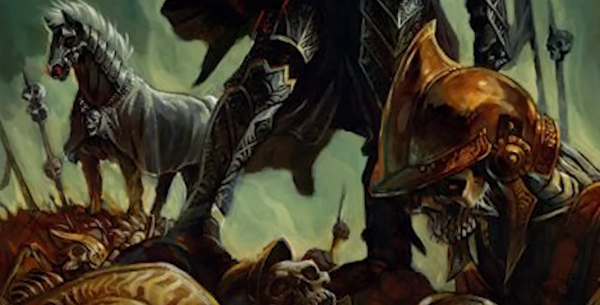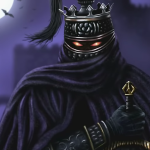A zombie breaks free from the dirt encasing their tomb, a soul is ripped from the afterlife and forced into servitude, an ally is brought back to life after their adventure is cut short- these are just a few examples of what the Necromancer Wizard is capable of when played in Dungeons & Dragons 5th Edition.
The Wizard that attends the School of Necromancy becomes a spellcaster who delves into the forbidden arts of life and death, commanding the forces of the undead and manipulating necrotic energy. This guide will provide an in-depth exploration of building and playing a Necromancer Wizard in D&D 5e, including character creation, abilities, and playing strategies.
Building your Necromancer Wizard
Choosing the best Race
We have two options for choosing your Wizard’s Race- Variant Human and Half-Elf. The Race you choose is important as it offers inherent boosts to specific Ability Scores, as well as influences your character’s backstory, how they view the world, how the world views them, and how you role-play through the campaign’s story. Variant Humans offer flexibility to your class with an additional feat gained at character creation.
This will allow you to further tailor your character to suit your necromancer’s playstyle, although you should check with your Dungeon Master if feats and Variants are allowed, as some tables may not want to overcomplicate their player characters.
On the other hand, the Half-Elf is also an amazing option. Half-Elves possess a blend of both Elven grace and Human adaptability, allowing you to take a bonus to Charisma and two other ability scores of your choice, making the Race both versatile and suitable for necromancer characters.
Allocating Ability Scores
Your Ability Scores will determine the overall effectiveness of your class. As a spellcaster, you will want to maximize the potential of all your spells, meaning you will want to take a bonus to Intelligence first and foremost.
The Intelligence stat is a Wizard’s primary casting stat, so the increase will provide an early bonus to your spells’ power. Constitution should be your second Ability Score to increase, since Necromancer Wizards often find themselves in dangerous situations, so increasing your Constitution can improve your survivability.
Whether it is an inherent bonus from your race, background, or a bonus you receive later in the campaign, these two stats should be a priority when power-scaling your character.
School of Necromancy
The Wizard Schools are just fancy ways of saying subclass. You will take the School of Necromancy to become the Necromancer of your dreams, specializing in the manipulation of life and death and providing unique benefits as well as enhancing your necrotic abilities.

Choose necromancer spells
This is by no means an exhaustive list of necromancer spells, and players should research the spells they want to use based on flavor, strategy, and class optimization. That being said, here is a sample list of spells for levels 1 through 5.
Cantrips
Chill Touch, Mage Hand, and Minor Illusion. The first of these cantrips is necrotic in nature, lending itself to your class theme. The other two are great for utility since they do not cost anything other than an action anyway.
1st Level Spells
Ray of Sickness, False Life, and Find Familiar are great level 1 necromancy spells. Again, the first spell deals damage, and the second and third offer defense and utility respectively. Ray of Sickness also combines with your School of Necromancy abilities and will heal for triple the level it is cast if it kills an enemy.
2nd Level Spells
Ray of Enfeeblement is the best choice here for the Necrotic theme. You can add this spell to your spellbook for half the cost and at half the time it takes, plus it applies a valuable damage debuff to enemies, supporting your lower defenses and keeping the damage everyone else receives to a minimum as well.
3rd Level Spells
Animate Dead and Vampiric Touch. You automatically gain Animate Dead at Necromancer Wizard level 6, so feel free to take a different 3rd-level spell when the spell slots become available; however, it is the most useful 3rd Level spell in your list and rounds out what your class is meant to do early in your build.
Vampiric Touch is another option for necromancers as it again combines well with your Wizard School, plus it heals naturally. This means if you were to kill a target, you would recover the base health from the spell, plus triple whatever level you cast the spell at. This can quickly put a Necromancer Wizard at full health without consuming a healing potion.
4th Level Spells
Blight and Phantasmal Killer. Blight is the premier necrotic spell of choice while Phantasmal Killer doubles as both a psychic damage spell- which is good for mixing up your damage options- and an illusion spell which can act for utility. Conjuring an image of the target’s worst fear also creates interesting role-play opportunities and plays into the flavor of one that toys with the essence of life.
5th Level Spells
Danse Macabre and Raise Dead. Both of these spells deal with necromancy, adding to your character’s development and enhancing their flavor. Danse Macabre allows you to target a group of bodies, giving your subclass abilities a chance to shine with each body raised.
While Raise Dead can bring a target back to life without having to control their mental state. Both spells will allow the user to play their Necromancer Wizard to the fullest, although Raise Dead can be a bit expensive, so if possible, plan accordingly ahead of time.

Exploring Necromancer Build Abilities:
Necromancy Savant
Beginning when you take this school at 2nd level, the gold and time you must spend to copy a Necromancy spell into your spellbook are halved. This will support gaining spells that fit your style of Necromancer.
Grim Harvest
Also at the 2nd level, Necromancer Wizards gain the ability to drain their target’s life force upon killing them. If you cast a spell and kill a target, excluding constructs and undead, you will gain Hit Points equal to twice the spell’s level, or triple the spell’s level if the killing spell belongs to the School of Necromancy.
Undead Thralls
At the 6th level, Necromancer Wizards automatically add the Animate Dead spell to their spellbooks if they already do not have it there. When you cast Animate Dead while in the School of Necromancy, you can target one additional corpse or pile of bones, creating another zombie or skeleton as appropriate.
This is particularly powerful as it will increase the number of allies in your party for a brief amount of time, which then increases your party’s overall damage output. Additionally, Undead Thralls adds benefits to your undead corpses when created with your necromancy spells.
These are: the creature’s Hit Point maximum is increased by an amount equal to your Wizard level, and the creature adds your proficiency bonus to its weapon damage rolls. Both of these increase your class potency by a lot, making your Necromancer Wizard a needed asset at your table.
Inured to Undeath
Beginning at the 10th level, the Necromancer Wizard gains a resistance to necrotic damage and their hit point maximum can no longer be reduced. This stems from the prolonged amount of time you have spent dealing with the ways of the undead arts.
Command Undead
Command Undead is the capstone of the School of Necromancy. Starting at the 14th level, your magic can now bring undead under your control, even those animated by other mages. As an action, you may choose one undead that you can see within 60 feet of you, and force that creature to make a Charisma saving throw against your spell save DC.
If the creature succeeds, you cannot attempt this feat again, but if it fails, it becomes friendly toward you and obeys your commands until you use Command Undead again. Intelligent undead are harder to control in this manner. If your target has an Intelligence of at least 8, it will have an advantage on the saving throw.
If it has an Intelligence of at least 12, it can repeat the saving throw once every hour until it succeeds and breaks free. This feat is quite powerful as there is no time limit on how long it lasts, only until the undead creature breaks free in some form.
Necromancer build playing Strategies
Commanding the Undead
As a Necromancer Wizard, one of your key strengths is controlling and commanding various undead creatures. Utilize your undead minions strategically in combat to provide additional damage, distraction, or protection.
Additional bodies fighting on your side on the battlefield will always be advantageous, especially if the enemy lacks important crowd control utility. Since you command the undead to act, you will have full control of their positioning as well, so make sure to utilize advantages and opportunity attacks as much as possible.
Necrotic Damage and Debuffs
Necromancer Wizards excel at dealing necrotic damage and imposing debuffs on their enemies. Focus on taking spells that inflict necrotic damage, weaken enemies, or drain their life force. Since your School of Necromancy gives a number of advantages to necrotic spells, you should stack your spellbook with them and look at the various utility and damage options available.
Balance Offense and Defense
While Necromancers are more than capable of dishing out high-damage rolls with their spells, remember to maintain a healthy balance of offense and defense.
Spellcasters such as the Wizard tend to have middling to lower defenses, so your defensive balance can take the form of utility spells or even allowing the allies in your party to handle protecting you while you unleash the undead onto your enemies.
Communication and Party Strategy
Communication is key to succeeding in any Dungeons & Dragons campaign, but as a Necromancer, it can be dangerous not communicating with your allies. If you reanimate the dead, make sure your party knows it is under your control.
Or else they may strike it or let it be caught in the area of effect of their attacks, thus wasting your action. Additionally, necrotic spells can hinder a party’s dynamic if they do not align with the general moral compass everyone follows.
While this should not deter you from playing what you want, be sure to discuss either through role-play or through meta-gaming the nature of your necrotic activities and if it would be ok with your party and Dungeon Master. Everyone should be entitled to a welcoming and enjoyable experience at the table, so any character conflict should still be used for fun, enjoyable role-play opportunities.
Embrace Roleplay
There are many roleplaying opportunities that come with playing a Necromancer Wizard. You can get creative with how your magic is presented or be selective in who you revive from the dead, but as a player, take the time to embrace the drawbacks as well as the advantages of necromancy.
Players get to explore the moral compass that comes from bending the whims of life and death to your will, as well as argue the ethical implications of reviving someone. If a devout Paladin dies and is about to go to their god, only to be revived because your party still needs them, how would that play out?
How should your Wizard handle that conversation? It will more than likely not be a simple acceptance, and this creates a fun dynamic that can be roleplayed extensively.
Final Words
That wraps up our coverage of the undead arts. Building and playing a Necromancer Wizard build in Dungeons & Dragons 5th Edition offers a unique and immersive experience. As a master over life and death, you will command the undead and harness the necrotic powers of your class to vanquish your enemies and achieve your goals, whether they are ethical or not.
While your spells will not save you from the inevitable philosophical discussions that come with raising the dead, the right spells and proper strategy in controlling the undead will make your Necromancer be at the top of their class. They can and will become a powerful force to be reckoned with both in the battlefield and during roleplaying between NPCs and players alike.
